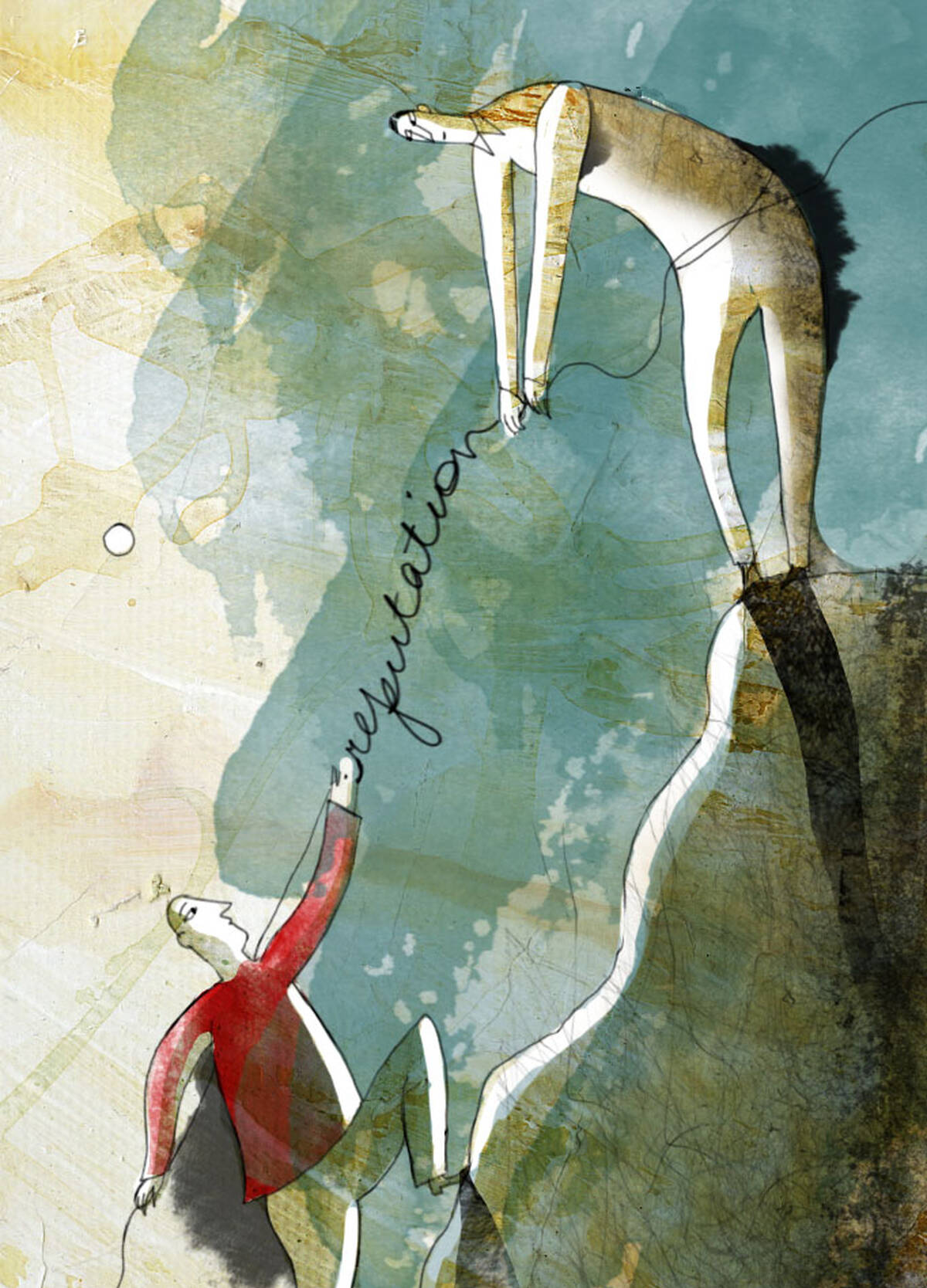Marketing Jun 2, 2015
We Trust Reputation. Should We?
The power of reputation might expose us to greater risk.

Yevgenia Nayberg
In every exchange relationship there is the possibility that one of the parties will act in bad faith. A babysitter might watch Netflix instead of keeping an eye on the children; a brokerage firm might earn more commission by pushing risky investments; a travel agent might book customers on his uncle’s overpriced jungle tour. There are, of course, a number of ways to guard against such opportunism. Contracts, for instance, set expectations, align incentives, and stipulate penalties. Professional organizations hold their members to certain standards. Insurance policies and lawsuits can protect us from negligence or deceit.
Check out more from The Trust Project at Northwestern University here.
According to Kent Grayson, a professor of marketing at the Kellogg School, there is another common safeguard that people rely on in the marketplace: the power of reputation. Whether we are buying pharmaceuticals, accepting website “terms of service,” or trusting mortgage brokers to engage us in large financial transactions, we tend to believe that organizations care about their reputations enough to treat us fairly.
“The problem,” Grayson says, “is that people assume they are protected by the invisible hand of reputation in ways that they’re really not.”
Reputation in Theory
In his research on reputation, Grayson, together with Gulnur Tumbat, considers two related economic frameworks—agency theory and transaction-cost economics—that seek to model the core dynamic of certain exchange relationships—specifically, those that involve a principal (who pays for a service) and an agent (who acts on the principal’s behalf). An agent might be anyone from a dentist to a sales representative—in fact, the model applies to just about any employment contract.
According to agency theory and transaction-cost economics, exchange relationships only work when both parties align their goals and successfully balance their risk. “In some cases,” Grayson says, “the interests of the principal and the agent can overlap quite well, but in most cases they’re not going to overlap perfectly because these are self-interested actors who have different goals.” The danger with too much goal conflict is that the agent may choose to act in a way that is contrary to the principal’s interests.
“When customers discount information, it becomes no better than noise.”
The risk is especially high when there is “information asymmetry”—when the agent has more or better information than the principal. Surgeons, lawyers, and car mechanics typically have more knowledge or expertise than the people who pay for their service, which gives them a clear advantage over patients, clients, and customers. They also have an added protection: “There is always a chance that the agent is going to do whatever he wants in secret,” Grayson says, “and if things go wrong, he’s going to blame it on something else.” In cases where something does go wrong, the principal has a hard time proving that it was the agent’s fault.
This is where reputation is supposed to play a balancing role. Most fundamental models of reputation assume that whenever information is communicated openly in the marketplace, the principal is protected from opportunistic behavior on the part of the agent. A careless surgeon will develop a reputation for carelessness; a dishonest car mechanic will suffer as word spreads. “Theoretically,” Grayson says, “reputation is meant to reduce information asymmetry.”
In reality, however, reputation does not always have the desired effect. Information does not travel perfectly through all markets, and even when it does, there are limitations to its impact. This complicates the traditional understanding of exchange relationships. While agency theory assumes that clients will only participate in a market if they have access to appropriate safeguards—such as guarantees, third-party insurance, or a dependable litigation process—Grayson’s research suggests that that is not always the case.
Trust at Twenty-nine Thousand Feet
In a recent working paper that studied expeditions to Mount Everest and Denali, Grayson and Tumbat found that hikers agreed to contracts that relied mostly on reputation and therefore exposed them to greater risk.
Of course, high-stakes expeditions always involve significant risk. The trek to the summit is grueling and—as the recent devastating earthquake on Mt. Everest has shown—conditions are highly volatile. But there is a second, perhaps less obvious, risk: that the company running the expedition will act in a way that prevents the client from reaching the summit.
Scaling a mountain, after all, is no small commitment. Clients pay enormous sums—around $50,000 up front—for the six-to-eight-week journey, and from the moment they arrive at base camp, they are expected to follow their guide’s instructions at all times. If a guide decides at any point that a client—due to illness or speed—is not fit to continue the trek, the guide has full authority to send the client back down the mountain. Clients also sign waivers promising not to sue.
“The contract leaves clients extremely vulnerable to opportunistic behavior on the part of the guide companies,” Grayson says. “It is not designed to maximize their chances of reaching the summit. So the question is: Why would people agree to such an unbalanced contract? And why do the companies not feel the need to offer a better one?”
In interviews with thirty clients and twenty-two guides, Grayson and Tumbat found that most clients feel that they are protected by reputation—that the fear of earning a bad name will act as a check on guides’ potentially opportunistic behavior. That means companies have little incentive to make the contract more balanced, and clients are left with a decreased chance of fulfilling their ultimate goal. “What we found,” Grayson says, “is that clients assume that reputation works when it really doesn’t.”
Signals and the Noise
For Grayson, part of the problem is a contradiction in customer behavior. Despite our belief in the power of reputation to protect us, our behavior often contrasts with the way reputation is supposed to work in exchange relationships.
One example is the tendency to discount negative signals. For example, when confronted with evidence that guides had acted opportunistically, clients on Everest or Denali tended not to value that information highly—in fact, most were quick to doubt the objectivity of their peers. Given all of the factors that might comprise a person’s judgment—fatigue, altitude sickness, distress—the community tends to assume that when a single hiker complains about a negative experience, the chances are good that his or her perspective is not entirely valid. Clients who claim that their guides sent them down for illegitimate reasons are suspected of making excuses for being unprepared or out of shape.
Another common instinct, as hinted at earlier, is to blame external factors for any issues that might arise. On these expeditions, clients will typically give their guides the benefit of the doubt in ambiguous situations such as bad weather or equipment problems. Few attribute accidents to a company’s opportunistic behavior.
As Grayson sees it, these attitudes undermine the role reputation is supposed to play in exchange relationships. “In a world where people are discounting signals for a variety of reasons, the value of that information is less effective,” he says. “When customers discount information, it becomes no better than noise.”
A Powerful (and Dangerous) Justification
From a consumer-welfare perspective, the implications of Grayson and Tumbat’s findings are potentially worrying. If customers believe that the effects of reputation are stronger than they actually are, organizations have less economic incentive to invest in the kinds of safeguards that might otherwise be necessary. And while the case of high-stakes expeditions may be unique in many respects, it does suggest a pattern of overconfidence in reputation.
This overconfidence has implications across the board, from the tourist industry to the sharing economy. Uber, Mealshare, and Airbnb all rely to a certain extent on the model of reputation laid out by agency theory and transaction-cost economics. Those who use these companies’ services trust that the person they are in business with has a strong incentive not to engage in opportunistic behavior.
And although we now have sites like Yelp and TripAdvisor that theoretically hold businesses accountable, these only go so far. “There’s no TripAdvisor for Everest,” Grayson says. “It’s a small market—about 225 people per year—so this means that information on the companies’ reputations is actually hard to get. And yet clients assume that reputation matters to these companies.”
The problem of reputation extends beyond the realm of extreme expeditions. Take, for example, the rapidly growing medical-tourism industry. Consumers typically have limited options for third-party insurance and are significantly less protected by legal remedies than in their home countries. Also, dependable information on doctors is difficult to find. Yet medical tourism generates more than $60 billion in global revenue.
“Reputation is still a powerful social account for people to justify their own actions or justify the actions of others,” Grayson says. “The problem is that that attitude might expose us to greater risk.”
Tumbat, Gulnur and Kent Grayson. 2013. “Protections Against Agent Opportunism: Customer Assumptions and Marketplace Realities.” In Advances for Consumer Research Volume 41, eds. Simona Botti and Aparna Labroo. Duluth, MN: Association for Consumer Research.
